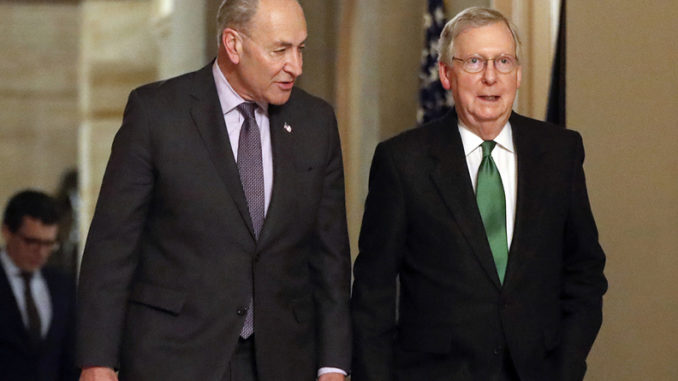
Republicans joined Democrats in preventing a filibuster of the measure, setting up final adoption of a fast-track process to raise the borrowing cap
WASHINGTON, D.C. (TIP): The Senate on Thursday, December 9, adopted a bipartisan deal that paves the way for lawmakers to raise the debt ceiling, a move that positions Congress to stave off a catastrophic default ahead of a fast-approaching fiscal deadline, a Washington Post report says.
The compromise, which now heads to President Biden’s desk, essentially puts to rest a fierce, months-long battle between Democrats and Republicans and appears to postpone the next round of wrangling over the country’s financial health until after the 2022 midterm elections.
The bill that lawmakers finalized Thursday does not actually raise the debt limit. Instead, it makes a one-time tweak to the Senate’s rules, allowing Democrats in the narrowly divided chamber to lift the borrowing cap without the risk of a Republican filibuster. Absent the unusual arrangement, GOP lawmakers would have blocked any increase as part of their broader protest of Biden’s economic agenda. In working out the deal, Senate Majority Leader Charles E. Schumer (D-N.Y.) and Senate Minority Leader Mitch McConnell (R-Ky.) ended a period of intense partisan sniping, as Democrats had faulted their GOP foes for putting the country at risk of recession as part of a political dispute. House and Senate lawmakers are set to complete the intricate process next week, raising the debt ceiling by trillions of dollars, in a move that could defuse the conflict into late next year.
“The nation’s debt has been incurred on a bipartisan basis, so I’m pleased that this responsible action will be taken today to facilitate a process that avoids a default,” Schumer said in a speech that praised McConnell before the vote. “This is the responsible path forward: no brinkmanship, no default on the debt, no risk of another recession.”
Fourteen Republicans including Sens. Mitt Romney (Utah), Joni Ernst (Iowa), Rob Portman (Ohio) and Lisa Murkowski (Alaska) joined Democrats in advancing the compromise, offering their votes earlier in the day to clear a key Senate procedural hurdle. A number of GOP lawmakers again aided Democrats in securing its final approval Thursday evening.
Schumer expresses optimism on debt ceiling hike
The arrangement left some Republicans uneasy, arguing they should not have provided any help to Democrats on the matter. “They have been spending money on a partisan basis without input from Republicans,” Sen. Mike Rounds (R-S.D.) told reporters before opposing the bill. The sharpest criticism came from former president Donald Trump, who attacked McConnell earlier this week for negotiating with his political foes — even though Trump himself had to rely on Democratic votes to raise the debt ceiling during his administration. “The Dems would have folded completely if Mitch properly played his hand,” Trump said. The bitterly divided Senate reached the compromise on Tuesday, resolving a protracted between Democrats and Republicans that carried immense financial stakes — threatening, in the case of inaction, to plunge the economy into a recession. McConnell initially had refused to supply GOP votes for a direct increase in the debt ceiling, which allows the United States to borrow money to pay its bills, as part of the party’s opposition to Biden’s broader spending agenda. Instead, he called on Democrats to address the measure on their own using the same legislative maneuver they intend to invoke to pass a $2 trillion initiative that aims to overhaul federal health care, education, climate and tax laws.
But Schumer refused to take that route, arguing it was too politically risky so close to a deadline. Some Democrats also had hoped to suspend the debt cap, rather than raise it by a specific amount, to dodge political attacks entering the midterm elections. And many blasted Republicans for hypocrisy, since Democrats still aided Trump on the debt ceiling even when the former president pursued policies that his foes did not like.
The political stalemate nearly pushed the country to the fiscal brink in October, raising the potential for a global economic disruption, until McConnell relented and Republicans supplied the necessary handful of votes to adopt a short-term increase. That bought the U.S. government until Dec. 15, at which point Treasury Secretary Janet L. Yellen has predicted the country may not have enough money to cover its financial obligations.
Both sides consequently embraced the new arrangement as a political victory. Republicans won’t have to vote again on an actual, numerical increase to the debt ceiling, and Democrats can say they did so after some measure of bipartisanship and without risk of GOP obstruction. The fast-track procedure guarantees a vote on the increase set at a simple majority, with no opportunity for a filibuster.
(Source: The Washington Post)





Be the first to comment